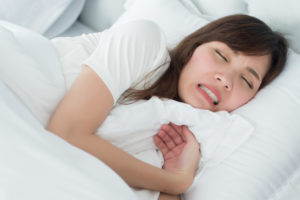 The holiday season is almost here, which means there are presents to buy, parties to plan, and family gatherings to survive. Most people agree that while the holidays are the best time of year, they can also be the most stressful. Even though grabbing a gift at the store before rushing off to the annual Christmas party at work may feel like just a normal part of the season, a stressful holiday can be damaging. If you ignore your stress during the day, you may be hurting your oral health at night. Many people suffer from something called bruxism, which seriously damage your teeth while you sleep. Bruxism can threaten to keep you from getting into the holiday spirit by causing poor sleep, headaches, and even tooth damage.
The holiday season is almost here, which means there are presents to buy, parties to plan, and family gatherings to survive. Most people agree that while the holidays are the best time of year, they can also be the most stressful. Even though grabbing a gift at the store before rushing off to the annual Christmas party at work may feel like just a normal part of the season, a stressful holiday can be damaging. If you ignore your stress during the day, you may be hurting your oral health at night. Many people suffer from something called bruxism, which seriously damage your teeth while you sleep. Bruxism can threaten to keep you from getting into the holiday spirit by causing poor sleep, headaches, and even tooth damage.
What Exactly is Bruxism?
Bruxism is the medical term for grinding, clenching, or gnashing your teeth. Although you can unconsciously grind your teeth while you’re awake, bruxism is technically classified as a sleep-related movement disorder since it often occurs while you’re asleep. Occasional teeth grinding is normal and will often cause no damage, but prolonged bruxism can lead to more serious complications and damage if not treated.
Do You Have Bruxism?
Since most, if not all, of your teeth grinding will happen in your sleep, it can be hard to tell if you grind your teeth at night. That’s why it’s important to watch out for symptoms like:
- Damaged tissue from chewing the inside of your cheek
- Jaw, neck, or face pain and soreness
- Dull headaches starting in your temples
- Increased tooth sensitivity or pain
If you think you might have bruxism, try some of the management tips below. However, if your symptoms are severe, it’s time to talk to your dentist before bruxism ruins the holidays.
How Do You Manage Bruxism?
If suffering from one or more of the symptoms above keep is keeping you from getting into the holiday spirit, you should talk to your dentist about bruxism right away. A regular dental examination will give your dentist enough information to know if you grind your teeth at night. To treat it, they might suggest a mouth guard, physical therapy, or prescribe muscle relaxants.
Thankfully, most cases of bruxism are mild and can easily be treated on your own with daily habits, like:
- Relieving stress with yoga or meditation
- Avoiding alcohol and caffeine
- Consciously stopping yourself if you notice teeth grinding during the day
While there’s no way to avoid all the stress that comes with the holidays, don’t let it grind away at your teeth while you sleep. With some easy daily habits and help from your dentist, you can treat Bruxism and get back to enjoying the season!
